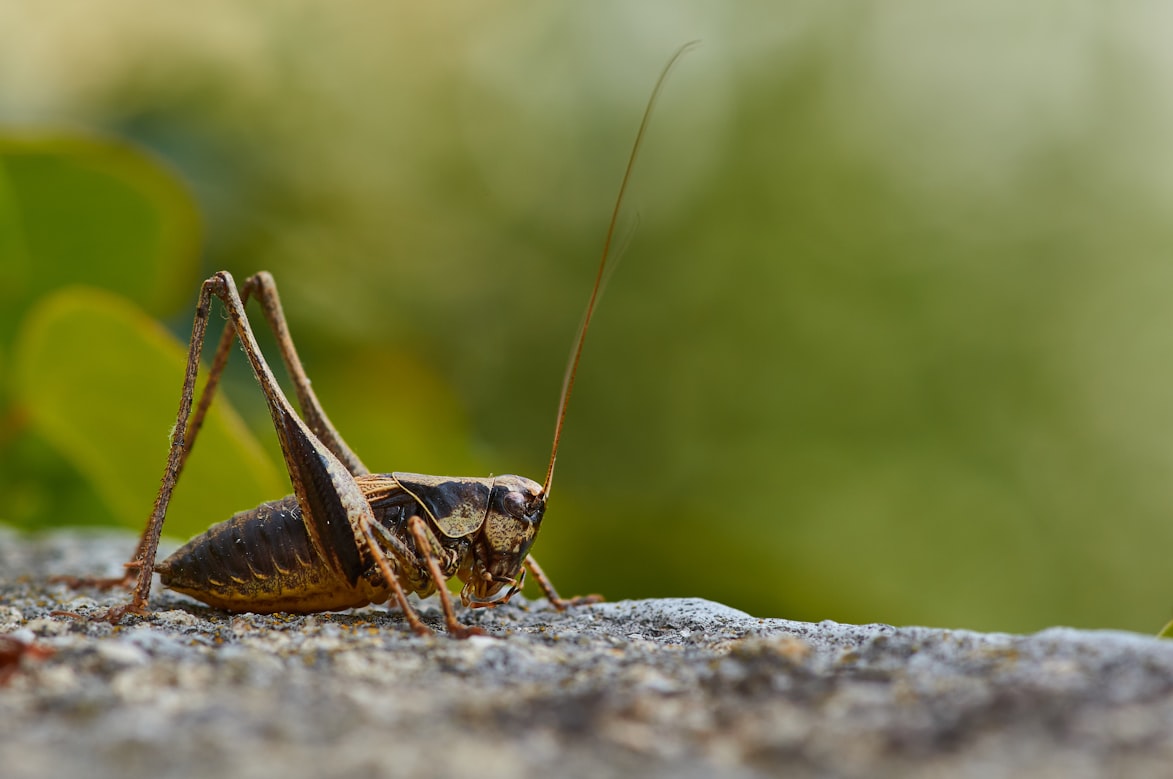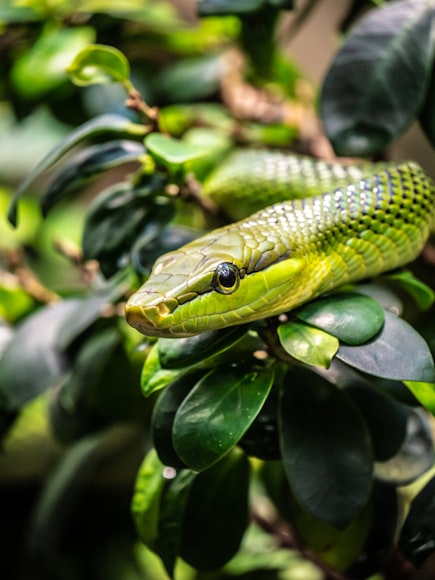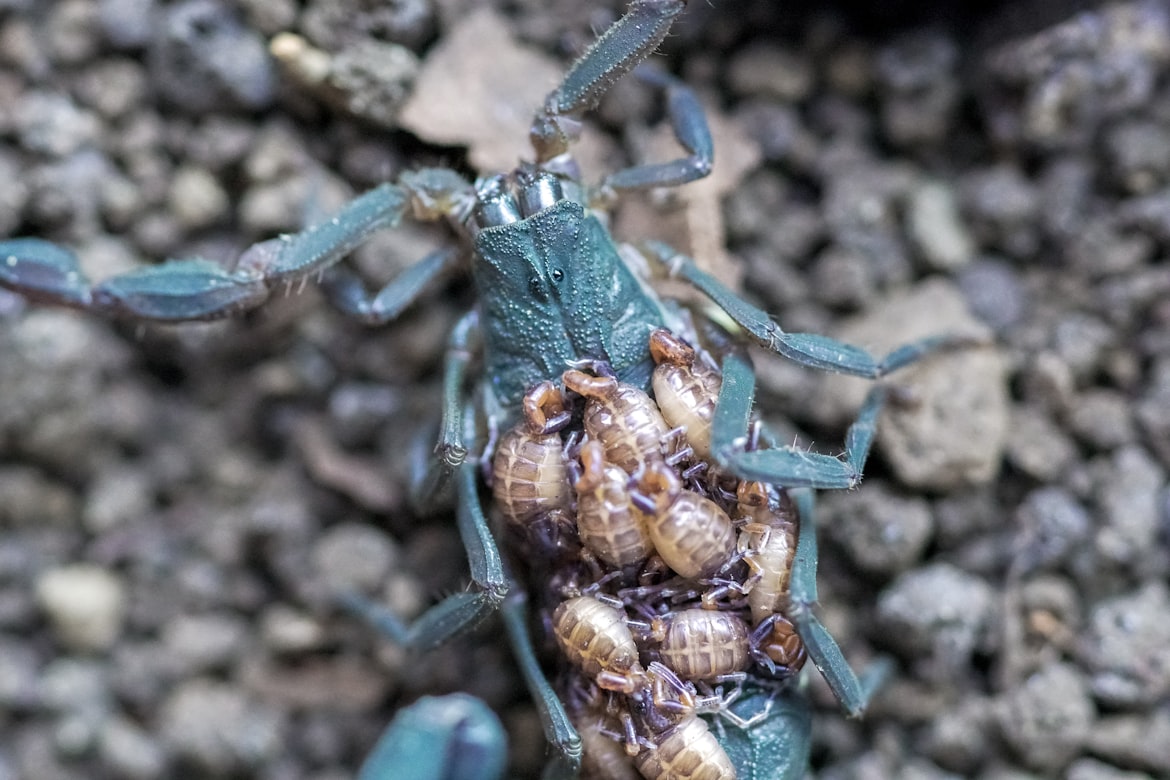As an Amazon Associate I earn from qualifying purchases.
What Do Baby Scorpions Eat?

Despite their rough appearance and intimidating presence, scorpions may make lovely companions. Scorpions are easy to care for, requiring only a modest food supply and a tiny amount of space. Because scorpion pregnancy lasts 10 to 14 months, it’s probable that you’ll end up with a pregnant female by accident. If your new pet has just given birth to a litter of babies, ensuring their safety and health should be your top priority.
A single brood of scorpions might produce as many as 100 young. They are born alive rather than hatching from eggs, similar to insects. When baby scorpions are born, they have a very fragile outer shell or exoskeleton. The crawlers begin their existence on their own by crawling up on the backside of their mother before having to live there for another 10 to 20 days. This is until their outer shell becomes rigid enough to become a solid. They then crawl down and start life on their own.
Scorpions are a class of arachnids. They’re in the same category as spiders, ticks, and mites. Scorpions have eight legs like other arachnids, but their sweeping tail that extends over their back is their most distinctive feature.
What Do Baby Scorpions Eat?

Naturally, the same standards of care apply to baby scorpions as those for full-grown ones. The only significant difference in treatment is that tiny invertebrates consume smaller nourishment.
Scorpions are ferocious hunters that lurk in dark, damp places or on your outdoor patio. They use their two pincers to capture food. To inject a neurotoxic venom that paralyzes the prey, lizard, or tiny mammal with a scorpion, it will sting its meal.
Scorpions capture their prey by capturing and crushing them, or stinging them with venom. Scorpions consume a lot of food in one sitting, which allows them to go months without eating.
Small, delicate baby scorpions require tiny prey items. What is small enough to feed newborn scorpions? We provide pinhead crickets and fruitflies as supplemental food for the babies after they’ve grown their first set of legs. Both of these are appropriate-sized invertebrates that baby scorpions will consume with ease.

Each day, put one or two pinhead crickets in the enclosure with each scorpion. Squishing the crickets may help to get little scorpions to consume live insects, but ours appear to be just fine eating live crickets.
In addition to food, your infant scorpions should have access to water. A tiny container that the newborn scorpions can’t drown in may be placed inside the cage, but we believe that moistening a cotton ball is a more effective method to hydrate your baby scorpions.
What Do Baby Scorpions Eat in The Wild?

Scorpions are nocturnal in the wild, hunting for food at night. Because lizards, birds, bats, and mice seek out scorpions as food, they conceal themselves during the day.
Scorpions consume a wide range of insects, spiders, and smaller animals. They acquire water from tiny pools or puddles to survive.
Scorpions have a lot of stored fat, and when it runs out, they can survive for days or even weeks on end with only their venom to keep them alive. According to Scientific American, Scorpions will eat anything long enough to paralyze it. These arthropods may stay immobile for hours in anticipation of food. Scorpions can consume so much food at once that they may go for weeks, if not months, without eating again. This implies that scorpions can also eat small snakes, lizards, and rodents if they are able to kill them.

Beetles are the most frequent sort of food for desert sand scorpions, according to a study. Scorpions have been observed eating grasshoppers, centipedes, locusts, and ants in the wild. They will also eat each other if nothing else is available. There’s even evidence that scorpions especially enjoy consuming spiders.
What Do Baby Scorpions Eat as Pets?

Scorpions are now quite popular as pets. As a result, people frequently inquire about what scorpions eat and if they consume spiders.
If you want to keep a scorpion as a pet, it’s crucial to remember that they are carnivores. As a result, they will not consume vegetables or fruits. Scorpions kept in captivity consume spiders, grasshoppers, crickets, moths, and other similar insects.
Scorpions do not require a constant supply of food in captivity. A scorpion kept in a tank at home may eat every other day or just 2 to 3 times per week, depending on the breed. Every 2 to 3 days, the desert scorpion can consume crickets, centipedes, moths, or mealworms. Scorpions will, of course, eat crickets and other similar-sized insects. Smaller insects are eagerly consumed by baby scorpions every other day.
The way a scorpion reacts when you put food in the tank is one method to determine if it’s consuming enough. If the scorpion aggressively attacks the bug, this might suggest that it is too hungry. It’s also vital to prevent the scorpions from having too much food since they may grow beyond their exoskeleton.
Do Scorpions Eat Their Own Children?

Baby scorpions may show up on the back of a mother scorpion if her owner is unaware. After giving birth, a mother scorpion will need a big meal since she will be hungry. If the mother scorpion isn’t fed enough, she may start feeding on her children. As a result, it’s only advised that you keep baby Scorpions in the same area as their mother if they’ve started eating from your food supply.
What do baby scorpions eat? While the baby scorpions are riding on their mother’s back, they will consume whatever food she provides. When they leave their mother’s back, they will begin to feed themselves. Baby scorpions and adult scorpions have a similar diet that consists of tiny insects, spiders, and pinhead crickets.
How To Take Care of Baby Scorpions?
Step 1
Prepare a separate cage for the new scorpions. A tiny water dish, heat source, substrate, and a few bits of bark or pebbles for them to explore are all required. The same environmental needs as their moms must be met by baby scorpions.
Step 2
Allow the mother scorpion to care for her young for the first one to two weeks. The youngsters will remain on her back and she will take all measures necessary to feed and protect them.
Step 3
Keep an eye out for the scorpions to leap off their mother’s back. When this happens, separate them and give her a hearty meal. The mother may eat her young if they are left in the same tank.
Step 4
Keep the youngsters together in a container and feed them one or two medium-sized crickets each week. If their mother has resumed feeding and they’re big enough to stay out of her mouth, they may be reintroduced to the tank with her. In order to avoid becoming food, mothers eat their young when stressed or desperate due to pregnancy.
What Are The Natural Predators of Baby Scorpions?
Scorpions are one of the most feared arachnids on earth, famous for their poisonous sting and hunting abilities. Because of these qualities, some people may overlook the fact that scorpions are also part of the food chain.
There are actually animals on Earth that can transform scorpions into their next meal, whether you believe it or not.
So, if you want to know what these creatures could be, here’s a guide that goes through it. These are only a few of the animals and insects that might harm the scorpion.
Meerkats
Meerkats are known for their diminutive size and adorable appearance, but they are fierce predators of scorpions. These clever creatures have even devised their own hunting technique, which they teach to the next generation.
When hunting for scorpions, the meerkat keeps an eye on their behavior. They’ll wait till they have a chance to pounce on the scorpion’s tail so it can’t spray its venom at them. In addition to their clever hunting strategy, the meerkat has a high resistance to scorpion venom and can withstand the scorpion
Shrews
The shrew, which is often nicknamed the “stinging mouse,” has proven to be a powerful adversary against a scorpion. These creatures are agile and aggressive. When combating a scorpion, the shrew uses its lightning-fast reactions to avoid the sting of the scorpion’s tail.
The shrew lashes out with its sharp teeth at the scorpion once it discerns an opportunity. The scorpion may be able to defend itself for a time, but the shrew will ultimately triumph due to its speed and aggressiveness.
Mongooses
The mongoose is unconcerned about poisonous food. In fact, mongooses attack and consume a variety of poisonous animals that many other species would avoid. Scorpions are one of these.
The mongoose is also immune to scorpion poison, as are meerkats. They can withstand numerous stings before deciding to call it a day. Mongooses are fast and clever, so they keep an eye on the scorpion’s movements while defending against the incoming assaults. Once they’ve figured out how to defeat the Scorpion, mongooses kill and maim in a matter of seconds, making them a deadly opponent for Scorpions.
The Southern Grasshopper Mouse
Because of its distinct anti-sting defense mechanism, the southern grasshopper mouse is a fascinating predator.
This little mouse’s body contains a protein that works in conjunction with the venom to block pain signals from reaching the brain. This allows them to continue battling the scorpion while being stung. The venom and this protein, in addition to the pain-blocking mechanism, are considered to work together to help them fight other types of pain. The scorpion has little chance against this predator if it doesn’t feel pain.
Owls
Owls are remarkable hunters that hunt quickly, silently, and accurately, often in the dead of night. They are not immune to scorpion venom like the preceding animal.
Because the owl is so accurate and quick when striking, it may capture a scorpion without having to battle it. The owl’s strong beak destroys the arachnid swiftly. Scorpions are unable to defend themselves against the hunting abilities of the owl.
The Southern Ground Hornbill
The southern ground hornbill is an uncommon species that can be found in Africa. The southern ground hornbill is the fiercest of all hornbills. Because they’re so massive and weighty, they make formidable foes. The southern ground hornbill will strike at the scorpion with its huge beak, weakening it. Once the scorpion has stopped fighting and can no longer harm the bird, it is easily eaten.
Many of the animal species that this bird preys on include snakes, tortoises, and even smaller monkeys.
Bats
Bats are unique creatures. Bats have superior hearing and can hear scorpions crawling about in the dark places where they reside, in addition to being resistant to scorpion venom. They also have exceptional vision and can see Scorpions on the ground at night in their caves.
Bat bites are extremely successful because they’re resistant to venom, can see in the dark, and readily find scorpions, even if it’s dark. Scorpions must be extra careful of these creatures since some bats eat on a diet consisting of scorpion flesh.
Tarantulas
Despite the fact that tarantulas and scorpions are both arthropods, they do not get along. In reality, tarantulas and scorpions are constant foes. It shouldn’t come as a surprise that tarantulas frequently emerge victorious fights between the two.
Scorpions, on the other hand, have small bodies and no physical defenses against tarantulas. Scorpions are vulnerable to tarantula bites owing to their tiny size and lack of protective spines. Tarantulas have larger bodies and other physical advantages over scorpions, including large fangs filled with poison and a hairy body that improves their senses.
The Amazonian Giant Centipede
The Amazonian giant centipede, which may be found throughout South America and the Caribbean, is a formidable opponent for typical American centipedes. The tiniest known species of this huge arachnid is only 1 foot long. These spiders have extremely potent venom and a savage nature that makes them a formidable adversary for virtually any quadruped.
The Amazonian giant centipede feeds on a variety of insects and animals, including scorpions. It can harm snakes as long as its own shell protects it from attacks. As a result, it shouldn’t surprise you that the Amazonian giant centipede has no effect on scorpions.
Are Baby Scorpions Healthy To Eat?
Scorpions are the favorite street food in China, and they may be found in California, Arizona, New Mexico, and other parts of the Southwest. They have a crab-like flavor. Before eating a scorpion, remove the stinger to avoid getting poisoned. The majority of the time, the poison is created and kept in the top two or so segments of the tail. And remember to cook them! The venom’s harmful effects are usually offset by cooking, but allergic reactions can still occur.
Amazon and the Amazon logo are trademarks of Amazon.com, Inc, or its affiliates.

